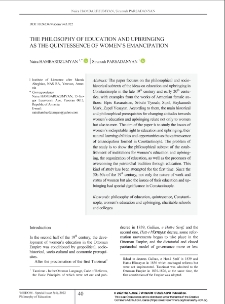Object
Title: The Philosophy of Education and Upbringing as the Quintessence of Women's Emancipation
Journal or Publication Title:
Date of publication:
Volume:
Number:
ISSN:
Corporate Creators:
Խ․ Աբովյանի անվան հայկական պետական մանկավարժական համալսարան
Coverage:
Abstract:
The paper focuses on the philosophical and socio-historical subtexts of the ideas on education and upbringing in Constantinople in the late 19th century and early 20th centuries, with examples from the works of Armenian female authors: Elpis Kesaratsian, Srbuhi Tyusab, Sipil, Haykanush Mark, Zapel Yesayan. According to them, the main historical and philosophical prerequisites for changing attitudes towards women‟s education and upbringing relate not only to women but also to men. The aim of the paper is to study the issues of women‟s indisputable right to education and upbringing, their natural learning abilities and opportunities as the quintessence of emancipation formed in Constantinople. The problem of the study is to show the philosophical subtext of the establishment of institutions for women‟s education and upbringing, the organization of education, as well as the processes of overcoming the patriarchal tradition through education. This kind of study has been attempted for the first time. Since the 50s-60s of the 19th century, not only the nature of work and status of women but also the issues of their education and up-bringing had special significance in Constantinople.
Place of publishing:
Երևան
Publisher:
Format:
Identifier:
oai:arar.sci.am:372194
Language:
Object collections:
Last modified:
Oct 8, 2025
In our library since:
Apr 3, 2024
Number of object content hits:
80
All available object's versions:
https://arar.sci.am/publication/402132
Show description in RDF format:
Show description in OAI-PMH format:
-
Իմաստություն=Wisdom=Мудрость
-
Իմաստություն, 2013, N 1
-
Իմաստություն, 2014, N 1 (2)
-
Իմաստություն, 2014, N 2 (3)
-
Իմաստություն, 2015, N 1 (4)
-
Wisdom, 2015, N 2 (5)
-
Wisdom, 2016, N 1 (6)
-
Wisdom, 2016, N 2 (7)
-
Wisdom, 2017, N 1 (8)
-
Wisdom, 2017, N 2 (9)
-
Wisdom, 2018, N 1 (10)
-
Wisdom, 2018, N 2 (11)
-
Wisdom, 2019, N 1 (12)
-
Wisdom, 2019, N 2 (13)
-
Wisdom, 2020, N 1 (14)
-
Wisdom, 2020, N 2 (15)
-
Wisdom, 2020, N 3 (16)
-
Wisdom, 2021, N 1 (17)
-
Wisdom, 2021, N 1 (1) Special issue
-
Wisdom, 2021, N 2 (18)
-
Wisdom, 2021, N 3 (19)
-
Wisdom, 2021, N 4 (20)
-
Wisdom, 2022, N 1 (21)
-
Wisdom, 2022, N 1 (2) Special issue
-
Wisdom, 2022, N 2 (22)
-
Wisdom, 2022, N 2 (3) Special issue
-
Wisdom, 2022, N 3 (23)
-
Wisdom, 2022, N 3 (4) Special issue
- Editorial board
- Contents
- Editor`s Foreword
- Cultural Studies’ Approach as a Methodological Basis of Modern Pedagogical Education
- Digital Transformation of Education in the Context of Informatization of Education and Society Against the Background of Russian Armed Aggression: Current Problems and Vectors of Development
- Progressive Education: Views from John Dewey’s Education Philosophy
- Conceptual Model of a Smart Integrated Educational Environment
- The Philosophy of Education and Upbringing as the Quintessence of Women's Emancipation
- Social and Pedagogical Factors of Management in the Educational Space
- Orientation Strategies at Apparatgeist Era: Distributed Cognition and Romantic Ideals of Education
- Development of Digital Storytelling Based on Local Wisdom
- Philosophy of Education and Science in the Context of Digitalization of Society
- The Relationship of the Philosophy of Education and the History of Philosophy: A Forecast of Educational Trends 2022-2024
- Philosophy of Legal Education and Training in the Context of the Information Age
- Pancasila as a Philosophical Basis of Religious Education in the Context of Indonesian Religious Diversity
- Innovators: Advantages and Disadvantages of the Future Profession from the Perspective of Students
- Investigation of the Efficiency of Distance Learning in the Conditions of the Pandemic
- Philosophy and Education as Cultural Phenomena
- Moral and Justice as the Philosophical Basis of Legal Education: A Criticism of the Indonesian Ministry of Education's “Merdeka Belajar” and “Kampus Merdeka” Concepts
- Digital Transformation of Education and Humanization of Relationships in the Educational Environment: Some Aspects of Relationship and Mutual Influence
- Personal Development as a Key Criterion for Higher Education Quality
- Pedagogical Aspects of the Protection of Human Rights in the Context of the Philosophy of Education and Law
- Digitalization of Russian Higher Education: Difficulties of the Transition Period
- The Education Philosophy of Confucius and Its Implications for the Philosophical Innovation of Education in Vietnam Nowadays
- Notes to Contributors
-
Wisdom, 2022, N 4 (24)
-
Wisdom, 2023, N 1 (25)
-
Wisdom, 2023, N 2 (26)
-
Wisdom, 2023, N 3 (27)
-
Wisdom, 2023, N 4 (28)
-
Wisdom, 2024, N 1 (29)
-
Wisdom, 2024, N 2 (30)
-
Wisdom, 2025, N 1 (31)
-
Wisdom, 2025, N 2 (32)
-
Իմաստություն, 2013, N 1
| Edition name | Date |
|---|---|
| Hambardzumyan, Naira, The Philosophy of Education and Upbringing as the Quintessence of Women's Emancipation | Oct 8, 2025 |





